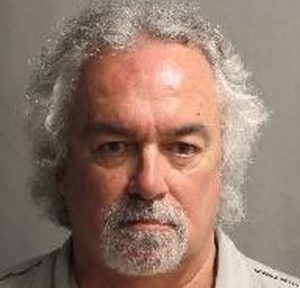Caution: This story deals with child sexual abuse and contains details some readers may find upsetting.
TORONTO – Once a financial advisor of three decades, and a man who seemed to lead an ordinary life with 42 years of marriage and two children, Wilfred Thyssen is now behind bars in a federal penitentiary.
The 67-year-old Fergus resident was sentenced in Toronto Court by Justice Jonathan Bliss this month to a term of more than five years in prison for arranging to have sex with children and breaching a bail condition.
Thyssen pleaded guilty in July and December last year to some of the 10 total charges against him, which included allegations of sexual touching involving someone under 16, possession and distribution of child sex abuse material, and failing to comply with court-ordered release conditions.
The charges stem from two different investigations involving the Toronto Police Service and the OPP, according to court records.
But before Canadian police started building cases against Thyssen, an undercover cop in Minnesota posing as a random 55-year-old man, began chatting with Thyssen in a public chatroom on the Kik messaging platform in 2021.
Though he would later downplay his intentions, Thyssen told the cop he was into incest and sex involving parents and their children, and asked if the man knew of anyone in Guelph who could help fulfill his fantasies.
The Minnesota cop instead recommended a contact in Toronto.
An internet child exploitation detective in Toronto took over, posing as a father of two children, ages 10 and 12.
Thyssen told the man he was “open to anything and everything” and went into much depraved detail about what he had in mind.
With $100 in cash, half a Viagra pill, and condoms in-pocket, Thyssen showed up at a hotel expecting to meet the father and children, but met members of the Toronto Police Service instead.
That led to the first group of charges, seven in total, including:
- three related to child sex abuse material (commonly referred to as child pornography);
- luring a child under 16 years of age;
- arranging to commit sexual interference; and
- two counts of attempting to sexually interfere with a child.
He was released on bail with court-ordered conditions, notably not to have internet access without direct supervision by his wife.
But it wouldn’t be the last time Thyssen found himself in handcuffs because of an online sting.
According to Thyssen, his spouse became less vigilant last summer. He seized the opportunity to log in to a website catering to sexual fetishes.
Thyssen began chatting with someone, who claimed to be a 32-year-old woman, to arrange sex with her and her 10-year-old daughter.
During the course of an obscenely graphic online back-and-forth with the woman between Sept. 13 and 21, Thyssen sent photos of himself with his face and penis exposed.
In one photo, he held up a sign stating “hi.” Court heard Thyssen told the woman his photos were for her child.
Later, he suggested the woman, who turned out to be a detective with the OPP’s internet child exploitation unit, and her daughter meet up with Thyssen to have sex. She agreed.
On Sept. 22, Thyssen was arrested in a Fergus Walmart parking lot, where he and the woman had agreed to meet.
That led to another three charges, including allegations of child luring and failing to comply with his prior release conditions.
Thyssen would later deny initiating contact with the detective, despite the evidence against him, and claimed the cop contacted him first. He also insisted he only spoke to the woman for the fantasy of it.
OPP detective Tim Brown coordinates 27 police agencies across the province to address internet child exploitation, and led September’s “Project Limestone” sting, netting seven other arrests, in addition to Thyssen’s.
Luring investigations are proactive and can be preventative, allowing police to identify those looking to meet up with kids for a sexual purpose, and intervene before that happens.
Brown told the Advertiser it’s nearly impossible to know how much of it is happening online.
Police put themselves out there and “wait and see who approaches,” he said, adding offenders come from “every walk of life.”
His top piece of advice for those with children: tell your kids to “not communicate with anyone, absolutely anyone who they do not know.”

WILFRED THYSSEN
Centre for Addiction and Mental Health forensic psychiatrist Dr. Hanna Meng stated in assessments of Thyssen that he showed “significant minimization” when attempting to justify his behaviour, and tried to detract from the criminality of his conduct.
Meng concluded Thyssen was deceptive and unreliable, and suggested a diagnosis of pedophilia or hebephilia (adult sexual desire for pubescent children) be considered.
The judge said he found Thyssen to be “genuinely remorseful.” But the question was would he reoffend?
“So driven was he by his desire to have sex with a child that he was unrestrained and undeterred by the impact on his family, or court orders, which raises real concerns about the level of risk that Mr. Thyssen presents,” Bliss said on April 4.
The Crown asked for an eight-year sentence.
Toronto defence lawyer Stefan Peters asked for just over three-and-a-half years.
Thyssen sobbed in court as he was handed a total six-year prison sentence for two counts of child luring, and failing to comply with his release conditions.
However, because Thyssen has been in custody since the September arrest, his real term is adjusted to a total of five years and two months, accounting for time already spent behind bars.
Thyssen’s sentence was also mitigated by something called the “Duncan credit” — in reference to a 2016 Ontario Court of Appeal case — available for offenders subjected to harsh conditions while in pre-sentence custody.
“The conditions that Mr. Thyssen has been subject to at Maplehurst … I find go well beyond the normal restrictions,” Bliss said.
Court heard Thyssen was one of three inmates in a single cell at the Milton jail for almost six months, who were subjected to 67 lockdowns, for reasons such as staff shortages, which limited or entirely eliminated time outside the cell.
Speaking to the Advertiser by phone, Thyssen’s defence lawyer said he generally doesn’t believe “locking people up is the best thing for them or society in the grand scheme of things.”
Peters said prevention and addressing behaviour should be the focus when it comes to crimes such as child luring, where police intercept someone before an offence harming a person is committed.
The judge relied on a 2023 appeal court decision, which states the primary objectives of sentencing for child luring are discouraging and condemning the crime.
The appeal court decision made several references to an oft-cited 2020 Supreme Court of Canada ruling known as “Friesen” that dealt with sexual offences against children.
Reports of child luring tripled between 2010 and 2017, the Supreme Court noted at the time, urging lower courts to give sentences better reflecting the catastrophic effects of sexual abuse on victims and society, and parliament’s intention to increase maximum sentencing ranges for sexual offences.
In 2015, the maximum penalty for child luring was raised to 14 years through the Tougher Penalties for Child Predators Act.
Though recent case law may advocate for stiffer sentencing above historical norms, Thyssen’s defence lawyer argued in court it doesn’t go so far as to demand it or determine a range.
“There’s no question that the sentences for these types of offences are going to be going up,” he conceded to the Advertiser.
The Supreme Court stated in 2020 that “mid-single digit” prison sentences are normal, and “upper-single digit and double-digit” sentences should not be unusual or exceptional.
In addition to being on a sex offender registry for 20 years, Thyssen is prohibited from accessing social media platforms and being around certain places where there are children under 16 years old.
Nor can he have contact with anyone under 16, unless he is actively supervised.
The judge allowed an exception to see his four grandchildren under supervision, but declined the defence’s request to allow Thyssen to access Facebook under supervision.
“That was tried and failed,” the judge said, adding his previous use of social media “put a child at risk.”
Remaining charges, including allegations that he solicited sexual touching from someone under 16, and possession of child sexual abuse material, were withdrawn by the Crown.
The Ministry of the Attorney General did not answer a question from the Advertiser by deadline asking why the remaining charges were dropped.
According to the Correctional Service of Canada, Thyssen will be eligible for unescorted absences in February. Such temporary absences can be used for visiting family, for example, and are aimed at gradual reintegration into society.
He can apply to the Parole Board of Canada for day parole in June, and full parole in December.
As of Sept. 14, 2027, Thyssen will have served two-thirds of his sentence, and by law he will be released from prison to serve the remaining third of his sentence in the community under certain conditions, while reporting to a parole officer.
His sentence formally ends in June 2029.
The Advertiser attempted to contact Thyssen’s spouse to include her voice in this story.
A woman, reached on April 17 at a phone number associated with Thyssen’s Fergus address, did not identify herself, but said her life has been destroyed and declined to comment before hanging up on a reporter.
Concerned neighbours said they’ve been aware of the charges against Thyssen and had pointed him out to their young children, telling them to “steer clear.”
According to one of the neighbours, who the Advertiser isn’t naming, Thyssen’s Fergus home was recently sold, and his car was seen being towed from the driveway last week.
Are you a parent or caregiver of a child? Visit the Canadian Centre for Child Protection for resources on keeping children safe online.



